
The Hanging Captain is a 1932 mystery detective novel by the British writer Henry Wade. Wade was a writer of the Golden Age of Detective Fiction, best known for his series featuring Chief Inspector Poole. This was one of a number of stand-alone novels he wrote.

A Dying Fall is a 1955 mystery detective novel by the British writer Henry Wade. It was the penultimate novel by Wade, one of the leading writers of the Golden Age of Detective Fiction. It was followed by his final novel The Litmore Snatch two years later

Constable Guard Thyself is a 1934 mystery detective novel by the British writer Henry Wade. It was the third in a series of seven novels featuring the character of Chief Inspector Poole, although it was preceded by the 1933 short story collection Policeman's Lot in which seven of the twelve stories had feaured Poole. After his more experimental novel Mist on the Saltings Wade returned to the traditional detective model.

The Verdict of You All is a 1926 mystery detective novel by the British writer Henry Wade, his debut novel. Both this and his following novel The Missing Partners revolve around potential miscarriages of justice. It was published in the United States by Payson and Clarke in 1927. A success it launched his career as one of the prominent writers during the Golden Age of Detective Fiction. The title refers to the traditional question asked in court by a judge of the jury to establish whether they have reached a unanimous verdict.

The Missing Partners is a 1928 mystery detective novel by the British writer Henry Wade. It was his second novel following his successful debut The Verdict of You All in 1926.
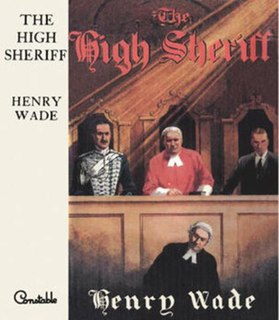
The High Sheriff is a 1937 mystery detective novel by the British writer Henry Wade. Wade was a writer of the Golden Age of Detective Fiction, best known for his series featuring Inspector Poole. This was one of a number of stand-alone novels he wrote, structured as a partially inverted detective story.
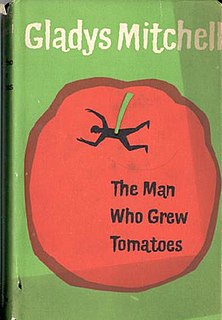
The Man Who Grew Tomatoes is a 1959 mystery detective novel by the British writer Gladys Mitchell. It is the thirty second in the long-running series of books featuring Mitchell's best known creation, the psychoanalyst and amateur detective Mrs Bradley.
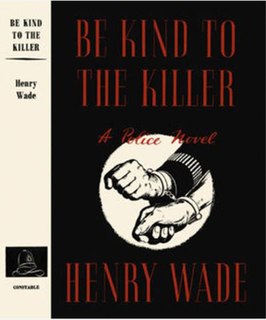
Be Kind to the Killer is a 1952 detective novel by the British writer Henry Wade. As with many of his works it is written in the style of a police procedural.
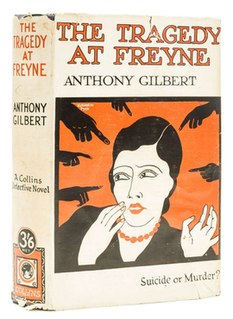
The Tragedy at Freyne is a 1927 mystery detective novel by Anthony Gilbert, the pen name of British writer Lucy Beatrice Malleson. Her first novel under the pseudonym, it introduced the amateur detective Scott Egerton who was her principle character until the creation of Arthur Crook in Murder by Experts.
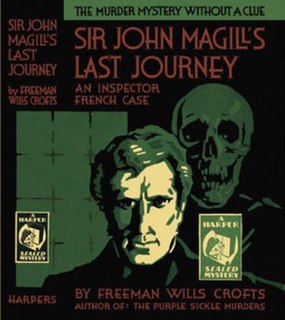
Sir John Magill’s Last Journey is a 1930 detective novel by the Irish writer Freeman Wills Crofts. It is the sixth in his series of novels featuring Inspector French, a prominent figure of the Golden Age of Detective Fiction. Much of the novel takes place in Northern Ireland, particularly around Belfast, where Crofts had spent a great deal of his younger years before moving to England. As with many of his puzzle mysteries its solution revolves around railway timetables as well as the possible distance a boat could cover in a certain time.

Death of an Author is a 1947 detective novel by John Rhode, the pen name of the British writer Cecil Street. It is the forty fifth in his long-running series of novels featuring Lancelot Priestley, a Golden Age armchair detective. The New Yorker described it as "Rather pleasant, in a ponderous fashion" while Will Cuppy, writing in the New York Herald Tribune, felt "Mr. Rhode provides one of those satisfying British stories in the old tradition, full of mystery meat and brain-work."
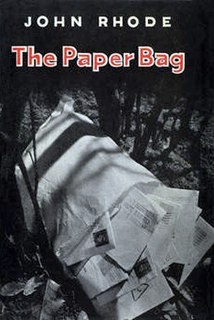
The Paper Bag is a 1948 detective novel by John Rhode, the pen name of the British writer Cecil Street. It is the forty sixth in his long-running series of novels featuring Lancelot Priestley, a Golden Age armchair detective. It was published in America by Dodd Mead under the alternative title The Links in the Chain.

The Two Graphs is a 1950 detective novel by John Rhode, the pen name of the British writer Cecil Street. It is the fiftieth in his long-running series of novels featuring Lancelot Priestley, a Golden Age armchair detective. It was published in America by Dodd Mead under the alternative title Double Identities. Writing in The Observer Maurice Richardson noted a "slight slackening of tension towards the finish but an excellent specimen of Rhode’s later period."
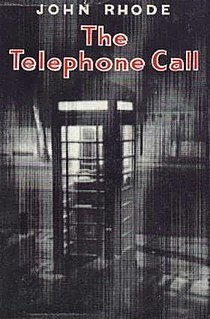
The Telephone Call is a 1948 detective novel by John Rhode, the pen name of the British writer Cecil Street. It is the forty seventh in his long-running series of novels featuring Lancelot Priestley, a Golden Age armchair detective. It was published in America by Dodd Mead under the alternative title Shadow of an Alibi. It is based on the real-life Wallace Case of 1931 in which William Herbert Wallace was convicted of murdering his wife Julia, a conviction which was later overturned on appeal.
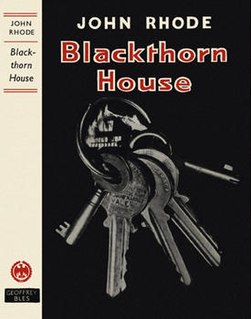
Blackthorn House is a 1949 detective novel by John Rhode, the pen name of the British writer Cecil Street. It is the forty eighth in his long-running series of novels featuring Lancelot Priestley, a Golden Age armchair detective.
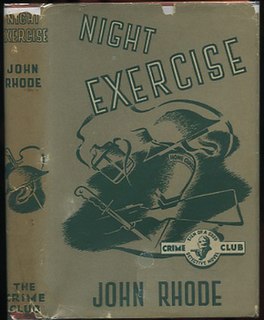
Night Exercise is a 1942 detective novel by John Rhode, the pen name of the British writer Cecil Street. It is a stand-alone wartime novel from Rhode, best known for his long-running series featuring Lancelot Priestley. It was published in America by Dodd Mead under the alternative title Dead of the Night.

The Lake House is a 1946 detective novel by John Rhode, the pen name of the British writer Cecil Street. It is the forty second in his long-running series of novels featuring Lancelot Priestley, a Golden Age armchair detective. It was his first novel after returning to his original publisher Geoffrey Bles after all his books between 1931 and 1945 had been published by Collins. His other series featuring Desmond Merrion continued to be released by Collins.
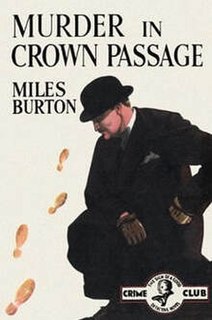
Murder in Crown Passage is a 1937 detective novel by the British writer Cecil Street, writing under the pen name of Miles Burton. It is the sixteenth in a series of books featuring the amateur detective Desmond Merrion and Inspector Arnold of Scotland Yard. Street was one of the most prolific authors of the Golden Age of Detective Fiction. It was published in the United States by Doubleday the same year under the alternative title The Man with the Tattooed Face. As often in the series, the setting is in rural England.
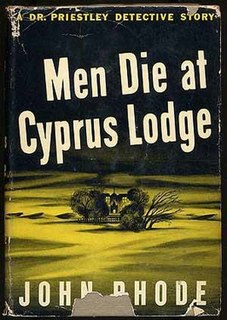
Men Die at Cyprus Lodge is a 1943 detective novel by John Rhode, the pen name of the British writer Cecil Street. It is the thirty eighth in his long-running series of novels featuring Lancelot Priestley, a Golden Age armchair detective. Reviewing it for the San Francisco Chronicle, Anthony Boucher wrote "at his best, nobody can touch Rhode for ingenious murder gadgets and very few can top him for meticulous unravelling; he's very close his best in this one".
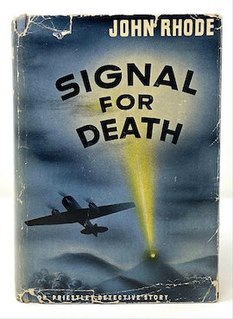
They Watched by Night is a 1941 detective novel by John Rhode, the pen name of the British writer Cecil Street. It is the thirty fifth in his long-running series of novels featuring Lancelot Priestley, a Golden Age armchair detective. It was published in the United States by Dodd Mead with the alternative title Signal for Death.




















